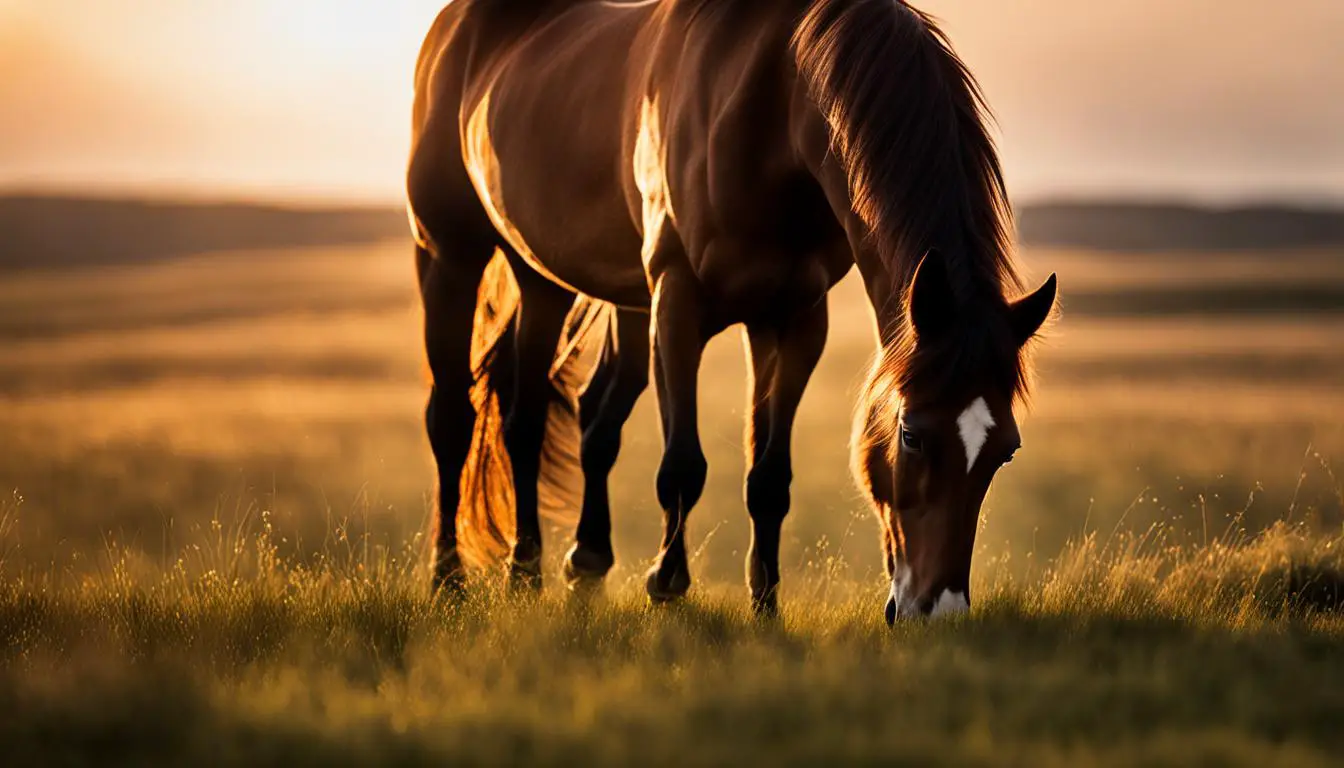Have you ever wondered why horses bob their heads? This peculiar behavior can be fascinating to observe, but it also holds valuable insights into their well-being and health. From head shaking to head nodding, horses exhibit these movements for various reasons.
Key Takeaways:
- Horses bob their heads for excitement, seeking attention, pain relief, aiding in chewing, irritation, and boredom.
- Head bobbing can also indicate ear or tooth infections, learned behavioral issues, lameness, and dental problems.
- Understanding the exact cause of head bobbing is crucial for proper care and addressing underlying issues.
- Managing horse care, providing appropriate exercise and mental stimulation, and addressing health concerns are essential in caring for horses that display head bobbing behavior.
- Consulting a veterinarian for diagnosis and treatment is necessary to address potential ear infections or other health conditions.
Reasons for Head Bobbing in Horses
Understanding the reasons behind a horse’s head bobbing behavior is essential to provide appropriate care and address any underlying issues. Horses may bob their heads for various reasons, each with its significance and potential implications for the horse’s well-being. The most common causes of head bobbing in horses include:
- Excitement or Eagerness: Horses may bob their heads when they are excited or eager, such as during feeding time or when anticipating a ride.
- Pain or Discomfort: Head bobbing can be a response to pain or discomfort, indicating the presence of underlying health issues like lameness, dental problems, or ear infections.
- Seeking Attention or Treats: Some horses learn to bob their heads as a way to seek attention from their handlers or to request treats or rewards.
- Aid in Chewing: Head bobbing can serve as a chewing aid, helping horses effectively break down and process their food.
- Irritation or Annoyance: Horses may bob their heads to communicate their irritation or annoyance with something in their environment, such as flies or uncomfortable tack.
Moreover, head bobbing in horses can also be a result of behaviors developed over time. For instance, horses might have learned to bob their heads due to boredom, finding the behavior rewarding as it releases endorphins. Understanding these various reasons for head bobbing enables horse owners to identify potential issues, seek appropriate veterinary care, and manage their horse’s well-being effectively.
“Head bobbing can be an intricate language horses use to communicate their needs, emotions, and physical state. By paying attention to their head movements, we can gain valuable insights into their well-being.”
It is important to note that each horse is unique, and the reasons behind their head bobbing behavior may vary. Therefore, close observation, professional guidance, and a comprehensive evaluation of the horse’s overall health are critical to accurately determine the underlying cause and provide the best care possible.
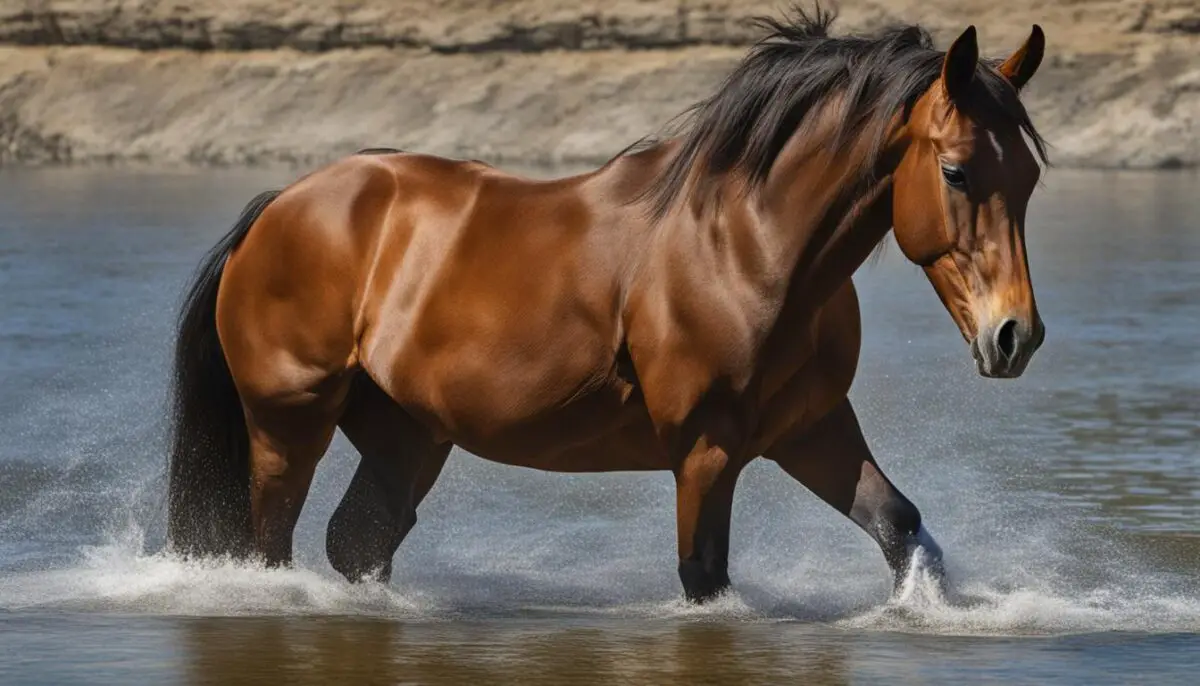
Head Bobbing and Horse Care
Recognizing the reasons behind a horse’s head bobbing is crucial for providing proper care. If the head bobbing is due to excitement, it is typically a normal behavior. However, if it is a result of pain or discomfort, addressing the underlying issue, such as dental problems or lameness, is essential. Managing insect irritation, providing a stimulating environment to prevent boredom, using fly repellents and protective gear, and maintaining proper saddle fit are also crucial in caring for horses that bob their heads.
When managing horse head bobbing, it is important to determine the underlying cause. If the head bobbing is due to excitement, ensure that the horse receives regular exercise and mental stimulation to channel their energy. Providing them with a suitable outlet for their exuberance can help eliminate or reduce head bobbing behaviors.
If the head bobbing is a result of pain or discomfort, it is essential to address the underlying issue. Dental problems, such as sharp or broken teeth, can lead to head bobbing. Regular dental check-ups and floating can help prevent dental issues and keep the horse comfortable. In cases of lameness or musculoskeletal problems, consulting with a veterinarian or equine specialist is recommended to develop a suitable treatment plan.
Horses that bob their heads may also be prone to insect irritation. Using fly masks, sheets, and repellents can help protect the horse from flies, gnats, and other pests, reducing the likelihood of head bobbing caused by their annoyance. Creating a stimulating environment with access to pasture, toys, and companions can also alleviate boredom, preventing the horse from resorting to head bobbing as a means of releasing pent-up energy or frustration.
Tips for Managing Horse Head Bobbing
| Tip | Description |
|---|---|
| Address Dental Issues | Regular dental check-ups and floating to prevent dental problems. |
| Seek Veterinary Consultation | Consult a veterinarian or equine specialist to address lameness or musculoskeletal problems. |
| Use Fly Repellents and Protective Gear | Protect the horse from insect irritation with fly masks, sheets, and repellents. |
| Create a Stimulating Environment | Provide access to pasture, toys, and companions to prevent boredom. |
| Ensure Proper Saddle Fit | Ensure the saddle fits properly to prevent discomfort and pain. |
By implementing these strategies, horse owners can effectively manage head bobbing behaviors and ensure the overall well-being of their horses.
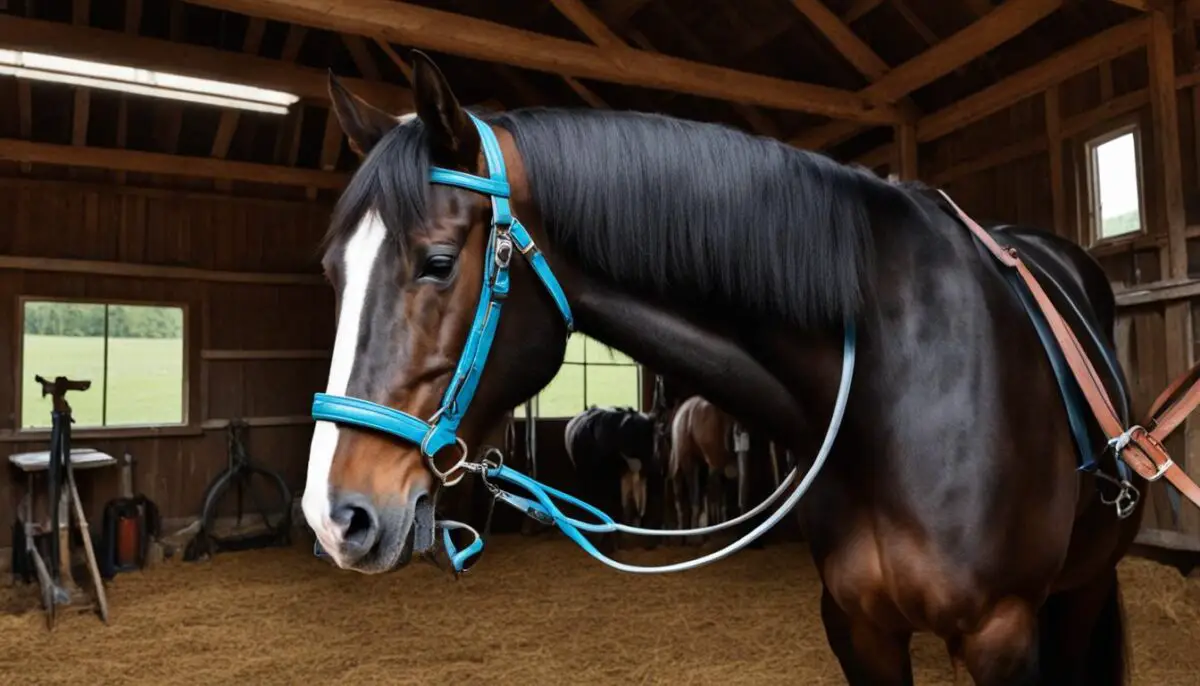
Head Bobbing and Horse Behavior
A horse’s head bobbing is a natural behavior that can provide valuable insights into their emotions and needs. Understanding equine head movements and body language is essential for interpreting a horse’s behavior correctly. Head bobbing can signify different emotions, including excitement, eagerness, or irritation.
Horses may nod their heads as a way to release endorphins when they are bored or coping with stress. It is important to observe the specific patterns and contexts in which a horse bobs their head, as this can offer clues to their current state of mind and well-being.
When a horse is excited or eager, they may bob their head up and down rapidly. This behavior is often accompanied by pricked ears and heightened alertness. On the other hand, if a horse is irritated or annoyed, they may bob their head in a more forceful and exaggerated manner, often accompanied by pinned back ears or swishing tail.
Interpreting Head Bobbing
It’s crucial to pay attention to the overall body language of the horse when interpreting head bobbing. For example, if a horse is bobbing their head and displaying other signs of tension, such as stiff posture or flared nostrils, it may indicate that they are feeling stressed or anxious.
Additionally, head bobbing can occur when a horse is in pain or discomfort. It is important to consider other accompanying behaviors and seek veterinary attention if the head bobbing is persistent or accompanied by other concerning symptoms.
“Understanding equine head movements and body language is essential for interpreting a horse’s behavior correctly.”
Responding to Head Bobbing
When a horse bobs their head, it’s important for horse owners and handlers to respond appropriately to their needs. If the head bobbing is due to excitement, providing appropriate outlets for the horse’s energy, such as increased exercise or mental stimulation, can help channel their enthusiasm in a positive way.
If the head bobbing is a result of pain or discomfort, it is crucial to address the underlying cause. This may involve consulting a veterinarian to identify and treat any health issues that may be contributing to the behavior.
Understanding equine head movements and body language is an ongoing process that requires observation, patience, and knowledge. By paying attention to the specific patterns and contexts in which a horse bobs their head, horse owners can develop a deeper understanding of their horse’s behavior and provide the appropriate care and support they need.
| Sign | Meaning |
|---|---|
| Rapid up and down head bobbing | Excitement or eagerness |
| Forceful and exaggerated head bobbing | Irritation or annoyance |
| Accompanied by tension and other signs of stress | Anxiety or unease |
| Accompanied by other concerning symptoms | Possible pain or discomfort |
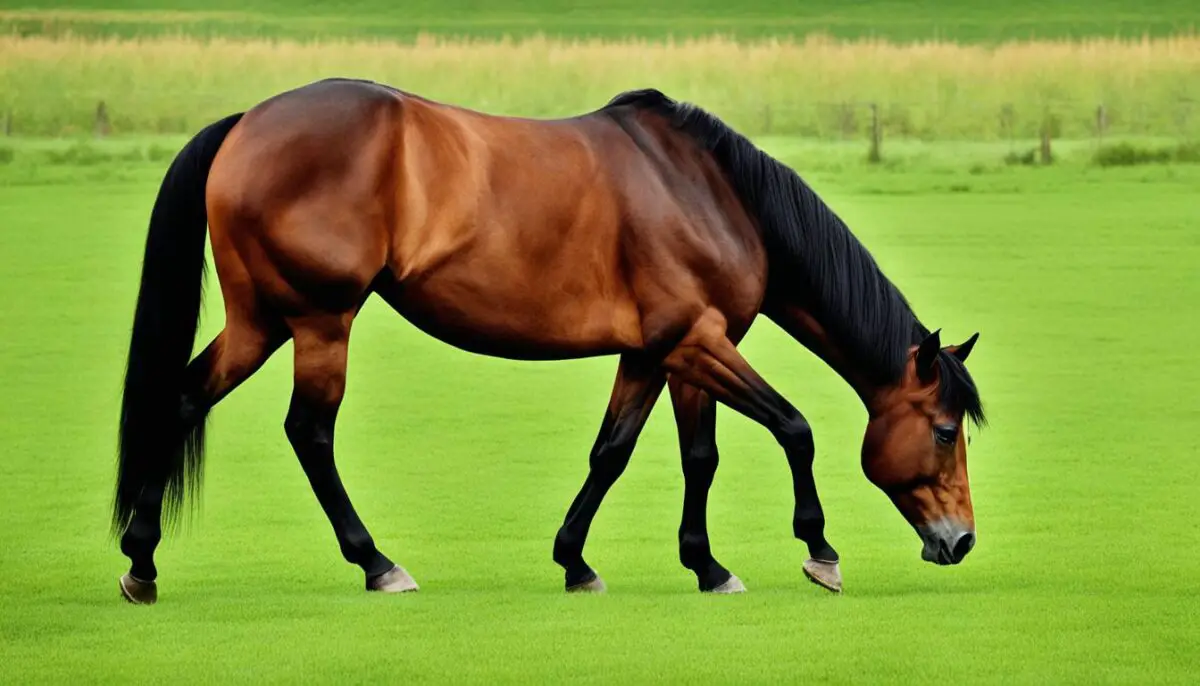
Head Bobbing and Ear Infections
Head bobbing in horses can be distressing for both the animal and its owner. It is crucial to identify the underlying cause of this behavior
to ensure the horse’s well-being and comfort. One possible cause of head bobbing is ear infections, which can lead to pain and discomfort.
Otitis externa, an infection of the external ear canal, can result in itching, redness, and swelling, which may prompt the horse to shake its head as a way to alleviate the discomfort. This repetitive head shaking is an instinctual response, indicating that the horse is trying to find relief from the irritation in its ears.
Proper diagnosis and treatment by a veterinarian are essential to address the underlying ear infection and relieve the horse from discomfort. The veterinarian will conduct a thorough examination of the horse’s ears, looking for signs of infection, inflammation, or other abnormalities.
If an ear infection is detected, the veterinarian may prescribe appropriate medication, such as antibiotics, to eliminate the infection. It is essential to follow the veterinarian’s instructions carefully and administer the medication as directed to ensure effective treatment.
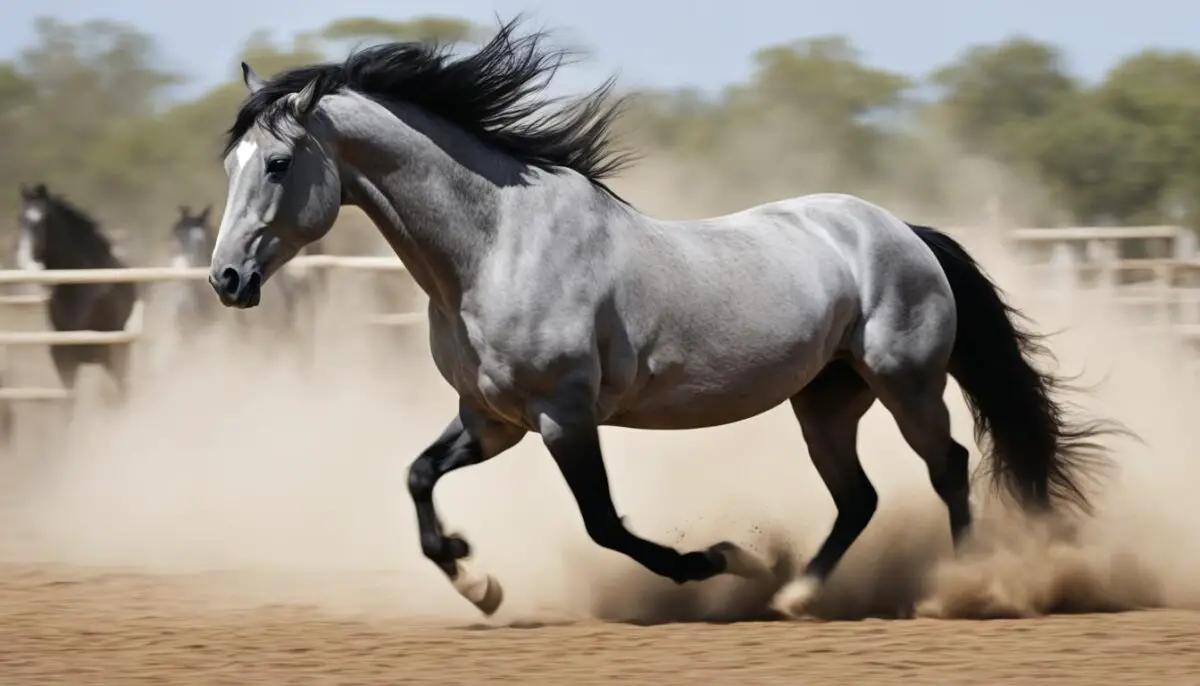
It’s important to note that horses have individual energy levels and exercise requirements, so it’s essential to tailor their exercise routine to their specific needs. Consulting with a veterinarian or an equine professional can help determine the appropriate amount and type of exercise for a horse with excess energy.
In summary, managing head bobbing caused by excess energy involves providing the horse with adequate exercise, turnout, and mental stimulation. By addressing the horse’s energy needs and ensuring they have enough opportunities to release excess energy, horse owners can help minimize head bobbing behaviors and promote their horse’s physical and mental well-being.
Head Bobbing and Nose Sensitivity
Some horses may exhibit head bobbing due to sensitivity in their nose. This behavior is often triggered by bright sunlight, which activates a nerve in their head resulting in a reflexive bobbing movement. Nose sensitivity-related head bobbing tends to be a quick reaction and is more commonly observed during sunny days.
To alleviate nose sensitivity and minimize head bobbing, horse owners can take certain measures. Providing shade in turnout areas or using protective gear, such as fly masks, can help reduce the horse’s exposure to bright sunlight and mitigate the sensitivity associated with nose-related head movements.
| Causes of Head Bobbing | Solutions |
|---|---|
| Reflexive response to bright sunlight | Provide shade or use protective gear such as fly masks |
| Other causes (excitement, pain, irritation, etc.) | Determine and address the underlying cause |
Expert Quote:
“Understanding and managing horse head bobbing related to nose sensitivity is essential. By providing shade or using protective gear, horse owners can help minimize the reflexive bobbing caused by bright sunlight, ensuring the comfort and well-being of their horses.” – Dr. Alexandra Wright, Equine Behavior Specialist
Conclusion
Horse head bobbing can be caused by a variety of factors, including excitement, pain, seeking attention, chewing aid, irritation, boredom, infections, lameness, and dental problems. Understanding the specific reasons behind a horse’s head bobbing behavior is crucial for providing the appropriate care and addressing any underlying issues.
By identifying and addressing the root causes, horse owners can effectively manage head bobbing and ensure the well-being of their horses. For instance, if the head bobbing is due to pain or discomfort, it is important to address the underlying issue, such as dental problems or lameness. Similarly, managing insect irritation, providing a stimulating environment to prevent boredom, and ensuring proper saddle fit are essential in caring for horses that bob their heads.
Overall, a comprehensive approach that considers the physical, behavioral, and environmental factors influencing head bobbing is crucial. With a thorough understanding and appropriate management techniques, horse owners can minimize or eliminate head bobbing behaviors and provide the best possible care for their horses.
FAQ
Why do horses bob their heads?
Horses may bob their heads for various reasons, including excitement, pain, seeking attention or treats, aiding in chewing, showing irritation or annoyance, releasing endorphins when bored, ear or tooth infections, insect irritation, learned behavioral issues, lameness, and dental problems. Understanding why a horse is bobbing its head can provide valuable insights into its health and well-being.
What causes horse head bobbing?
Horses may bob their heads to show excitement or eagerness, relieve pain or discomfort, seek attention or treats, aid in chewing food, display irritation or annoyance, release endorphins when bored, indicate ear or tooth infections, cope with insect irritation, exhibit learned behavioral issues, signal lameness during walking, or indicate dental problems when being ridden. Understanding these reasons can help horse owners determine the underlying cause and provide appropriate care for their horse’s well-being.
How can horse owners manage head bobbing in horses?
Recognizing the reasons behind a horse’s head bobbing is crucial for providing proper care. If the head bobbing is due to excitement, it is typically a normal behavior. However, if it is a result of pain or discomfort, addressing the underlying issue, such as dental problems or lameness, is essential. Managing insect irritation, providing a stimulating environment to prevent boredom, using fly repellents and protective gear, and maintaining proper saddle fit are also crucial in caring for horses that bob their heads.
How does head bobbing relate to horse behavior?
A horse’s head bobbing can be a part of their natural behavior and body language. It can indicate their level of excitement, eagerness, or irritation. Horses may also nod their heads to release endorphins when bored or cope with stress. Understanding the specific patterns and contexts in which a horse bobs its head can help horse owners interpret their behavior and respond appropriately to their needs.
Can head bobbing be a sign of an ear infection?
Yes, head bobbing in horses can be a sign of an ear infection. Pain and discomfort in the ears can cause horses to shake their heads as a way to alleviate the pain. Otitis externa, an infection of the external ear canal, can result in itching, redness, and swelling, leading to head bobbing. Proper diagnosis and treatment by a veterinarian are necessary to address the underlying ear infection and relieve the horse from discomfort.
How can excess energy contribute to head bobbing in horses?
Excess energy can sometimes lead to head bobbing in horses. If a horse has pent-up energy, it may display this behavior as a way to release some of that energy. Providing the horse with adequate exercise, turnout, and mental stimulation can help manage this behavior. Maximizing the horse’s turnout and ensuring it has enough opportunities to burn off excess energy can be beneficial in reducing head bobbing due to this cause.
Is head bobbing related to nose sensitivity?
Some horses may bob their heads due to sensitivity in their nose. Bright sunlight can activate a nerve in their head, causing a reflexive bobbing movement. This type of head bobbing is typically a quick reaction and more common during sunny days. Providing shade or using protective gear, such as fly masks, can help reduce the sensitivity and minimize the head bobbing associated with nose sensitivity.
How should horse owners handle head bobbing in horses?
Horse head bobbing can have various causes, including excitement, pain, seeking attention, chewing aid, irritation, boredom, infections, lameness, and dental problems. Understanding the specific reasons behind a horse’s head bobbing behavior is crucial for providing appropriate care and addressing any underlying issues. By addressing the root causes and managing horse care effectively, horse owners can help minimize or eliminate head bobbing behaviors and ensure their horse’s well-being.

